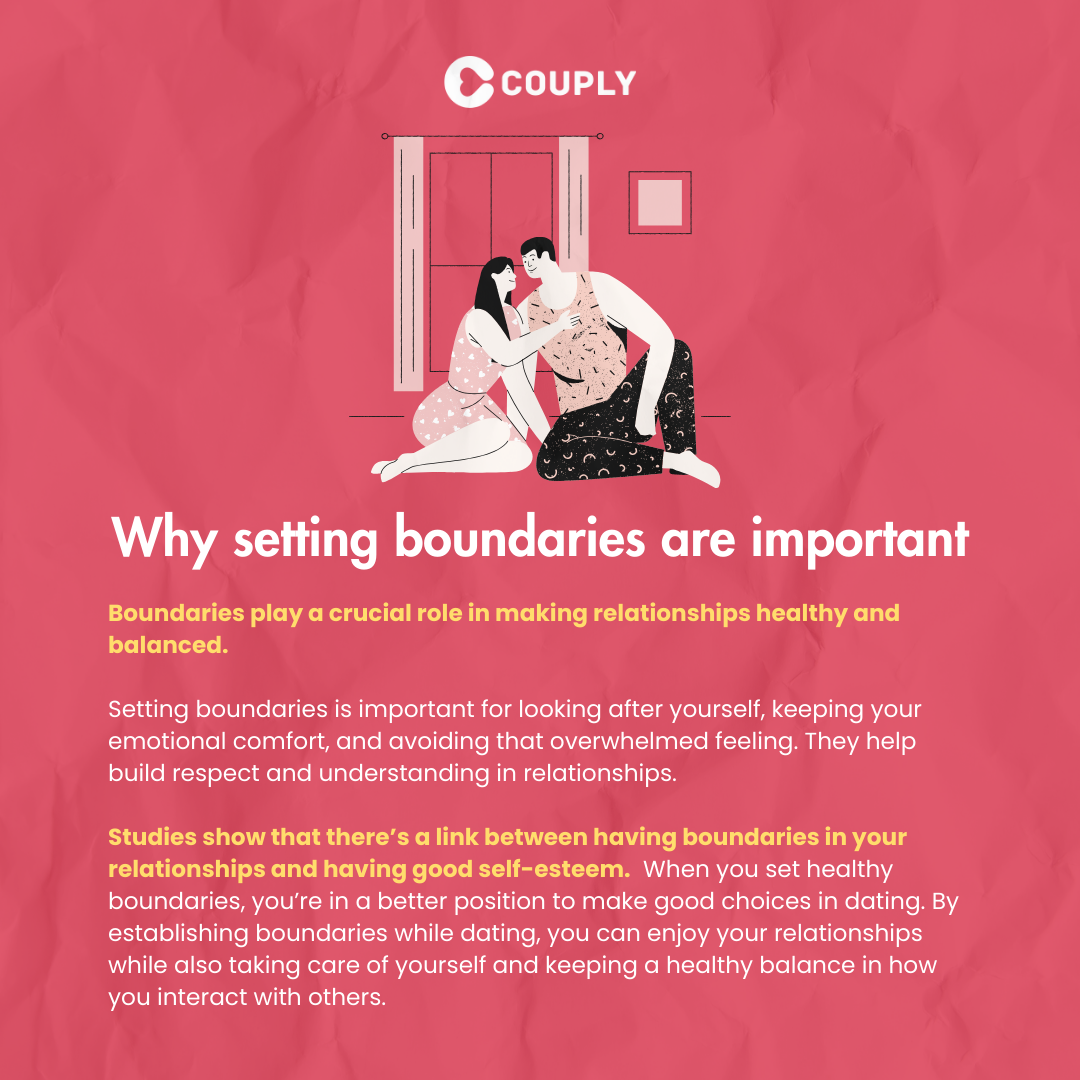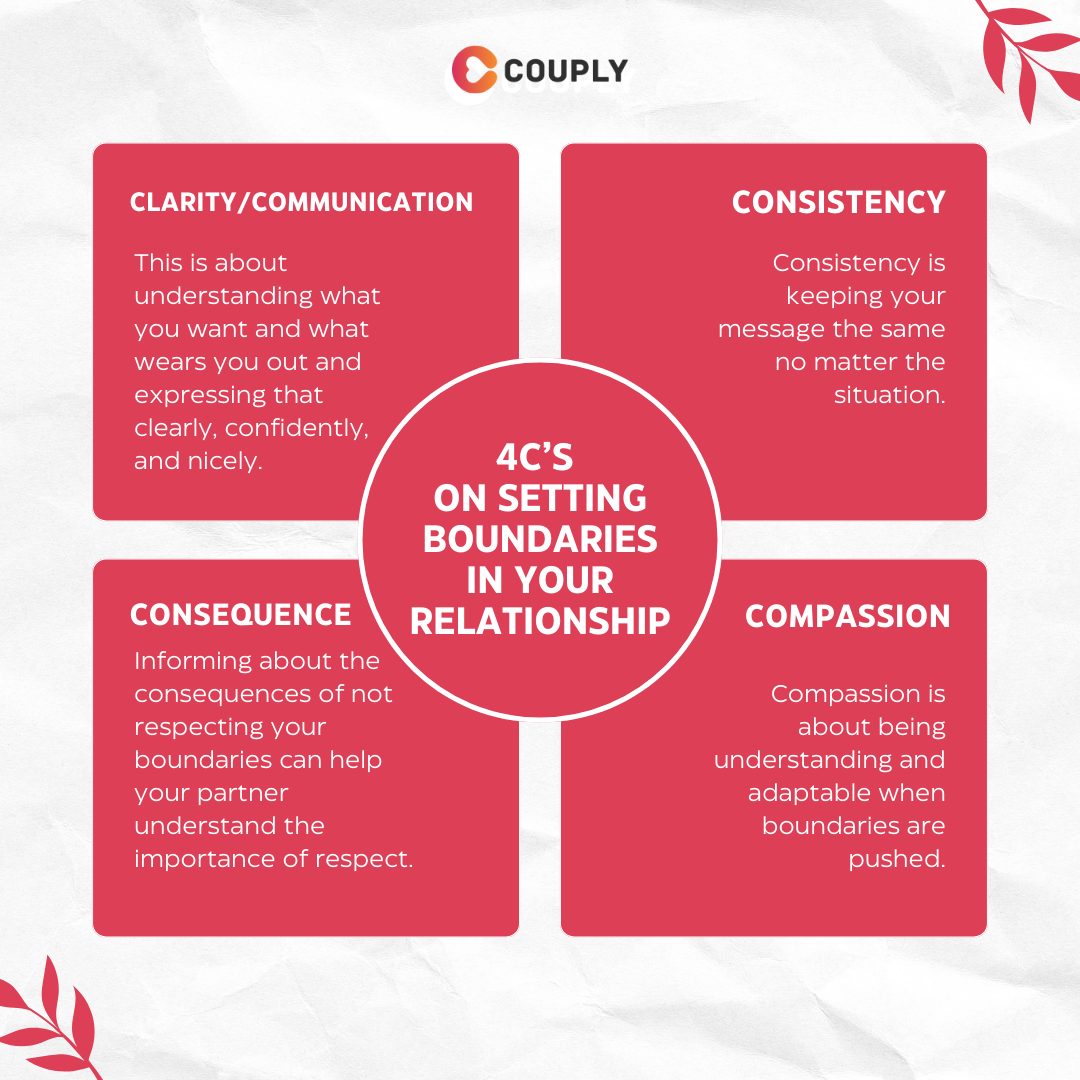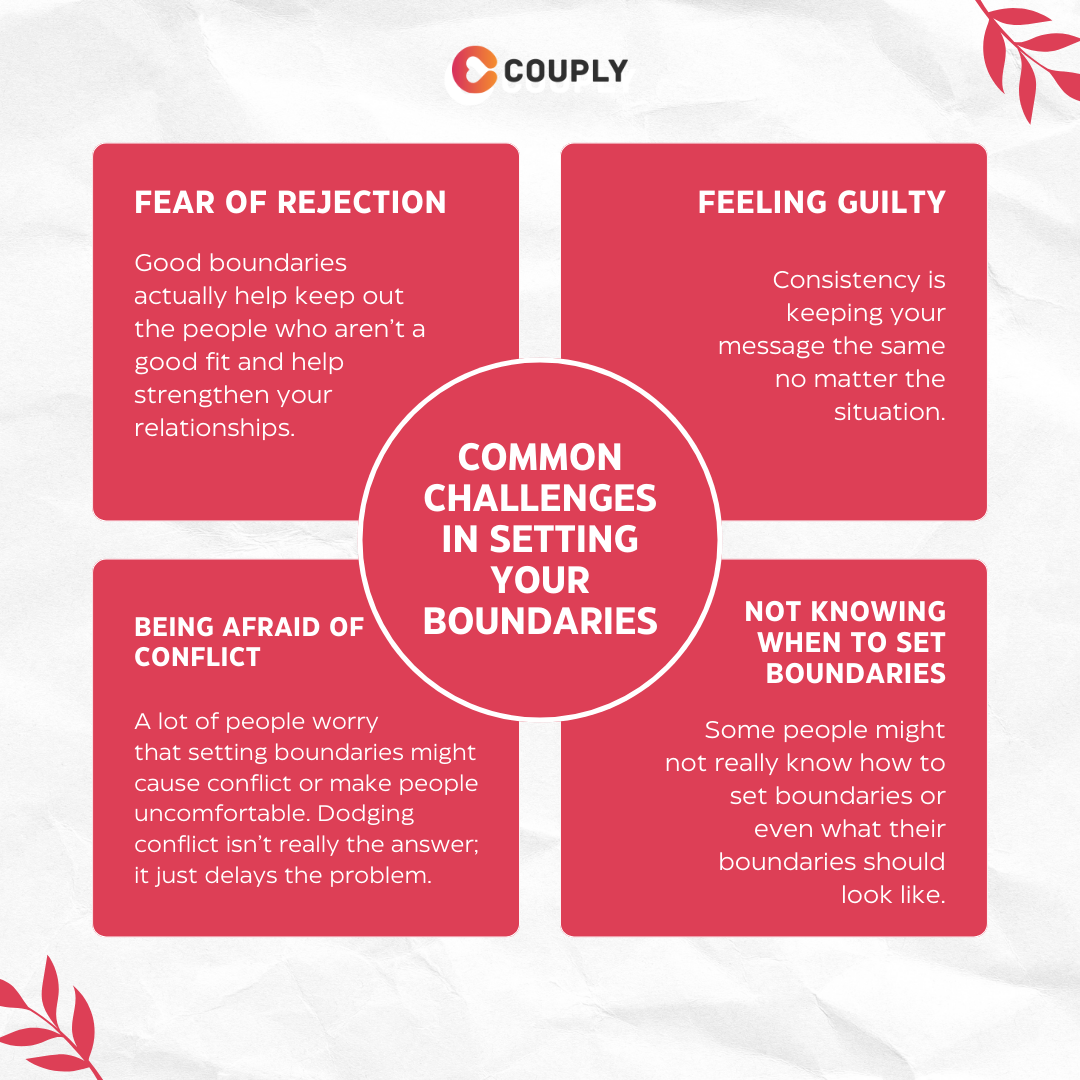Setting boundaries in a relationship is essential for maintaining a healthy and fulfilling connection with your partner.
Without clear boundaries, conflicts, misunderstandings, and resentment can arise, putting a strain on even the strongest relationships.
Why Setting Boundaries is Important?

Boundaries are essential for a healthy and happy life. They help us to protect our physical and emotional well-being, and they allow us to maintain healthy relationships.
When we set boundaries, we are telling others what we are and are not comfortable with. We are also setting expectations for how we want to be treated. These can also help to prevent any misunderstandings or hurt feelings. They serve as guidelines that respect personal space, emotional comfort, and mutual understanding. Much like a foundation provides stability to a house, boundaries lay the groundwork for trust, communication, and respect in a partnership.
There are many different types of boundaries, including:
- Physical boundaries: These boundaries involve our personal space and physical contact. For example, we may need to set a boundary with someone who is too touchy-feely.
- Emotional boundaries: These boundaries involve our thoughts and feelings. For example, we may need to set a boundary with someone who is constantly complaining or negative.
- Time boundaries: These boundaries involve how we spend our time. For example, we may need to set a boundary with someone who wants to monopolize our time.
A practical way to set boundaries effectively is by following the advice from Zara from the Couple's Couch with sticking to the 4 C’s.
4 C's on Setting Boundaries in Your Relationship

1. Clarity and Communication
Clarity is the compass that guides relationships through the labyrinth of emotions. When it comes to setting boundaries, it acts as a beacon, illuminating the path toward understanding and harmony. Clearly defined boundaries establish a shared understanding of each other's needs and limits, preventing misinterpretations and unwarranted discomfort. They provide a framework for communication, enabling partners to express desires and concerns openly.

In the realm of love, clarity isn't just a virtue; it's a lifeline that anchors relationships in mutual respect, ensuring that both partners navigate the journey hand in hand, fully aware of their emotional terrain. Communicate your boundaries clearly. Don’t give your partner room to argue or debate your boundary. It is your boundary, and you are the person that gets to set it.
2. Consistency
Consistency is the heartbeat of a thriving relationship, infusing it with reliability and trustworthiness. You want to keep the way you communicate your boundary consistently. Changing the wording and not holding the other person accountable for not respecting your boundary can lead to your partner being confused and unsure of how to respect your boundary.

Upholding agreed-upon boundaries consistently reinforces respect and demonstrates commitment. It builds a safe space where both partners can predict each other's responses and feel secure in the relationship's stability. In the symphony of love, consistency is the note that resonates, fostering an environment where growth, communication, and lasting affection can flourish.
3. Compassion
Compassion is the gentle breeze that sweeps through the garden of relationships, nurturing understanding and empathy. It encourages conversations that are free from judgment, allowing both individuals to express their desires and concerns with sensitivity.

In love, compassion intertwines with boundaries to create a tapestry of respect, where both partners feel heard, valued, and supported on their shared journey of growth and connection. Communicate your boundary with empathy and respect, and give your partner the time to learn it and figure out how to respect it.
4. Consequence
Consequence paints the canvas of accountability within relationships, adding depth and responsibility to the portrait of love. Let your partner know the consequences of not respecting or pushing your boundary. Don’t use this as a way to threaten your partner or issue an ultimatum, but to convey how important this boundary is to you and how far you are willing to go to respect it. Clear boundaries are the foundation upon which consequences are built - they outline the expectations and actions that define the partnership.

Consequences within this context aren't punitive, but rather they serve as a natural outcome of choices made. They maintain the balance of respect and mutual understanding, reinforcing the significance of boundaries and the commitment to their observance. Just as the ebb and flow of tides shape the shoreline, consequences mold the dynamics of a relationship, ensuring that the essence of each partner's needs is acknowledged and protected.
Staying consistent, communicating clearly and compassionately about your boundary, and letting people know the consequences of not respecting them can help your partner learn to respect your boundary.
Taking the couples quizzes in Couply app as well as answering the couples questions is a great way of exploring each other's boundaries and getting aligned on what's needed. Couply also has tons of free couples quiz, relationship questions, and games for couples that you can enjoy while building a healthier and stronger relationship.
Examples of Healthy and Unhealthy Boundaries in a Relationship

Healthy Boundaries in a Relationship
- Communicating your needs and wants. It is important to be able to communicate your needs and wants to your partner. This includes being able to say no when you need to and being able to ask for what you need.
- Setting expectations. It is also important to set expectations for your relationship. This includes things like how often you want to see each other, how you want to communicate, and how you want to resolve conflict.
- Respecting your partner's boundaries. It is important to respect your partner's boundaries, even if you don't agree with them. This means not pressuring them to do anything they are not comfortable with.
- Having separate interests and friends. It is important to have separate interests and friends from your partner. This will help you to maintain your individuality and avoid becoming codependent.
- Taking time for yourself. It is also important to take time for yourself, even when you are in a relationship. This will help you to recharge and avoid feeling overwhelmed.
Unhealthy Boundaries in a Relationship
- Controlling behavior. This includes things like trying to dictate who your partner can see or talk to, or trying to control their finances.
- Emotional abuse. This includes things like name-calling, insults, and threats.
- Jealousy. This includes being overly possessive or suspicious of your partner.
- Isolation. This includes trying to keep your partner away from their friends and family.
- Financial abuse. This includes things like controlling your partner's finances or refusing to give them money.
If you are struggling with boundaries in your relationship, it is important to talk to your partner about it. You may also want to consider seeking professional help.
Common Challenges in Setting Boundaries

Here are the common hurdles couples face when setting boundaries and discover effective strategies for overcoming these challenges together.
Fear of rejection
Many people hesitate to set boundaries because they worry it will lead to rejection, distance, or disapproval. The fear isn’t just about losing the relationship — it’s about losing acceptance, belonging, or emotional safety.
Guilt when saying no
Saying no can trigger guilt, especially for people who were taught that being “good,” “kind,” or “loving” means being accommodating. Even when a boundary is necessary, guilt can make it feel selfish or wrong.
Fear of conflict
For some, boundaries feel like an invitation to arguments, tension, or emotional fallout. If past conflicts felt overwhelming or unsafe, avoiding boundaries can feel like the only way to keep peace — even at the cost of self-respect.
Not knowing how to set boundaries
Many people were never taught what healthy boundaries look like in practice. Without clear models or language, setting boundaries can feel awkward, harsh, or confusing — leading people to avoid them altogether.
How to Overcome the Challenges of Setting Boundaries

If you are having a hard time in setting boundaries, here are some tips:
- Remember that you have the right to say no. Everyone has the right to set boundaries and to protect their own well-being.
- Challenge your negative thoughts. If you are afraid of rejection, guilt, or conflict, challenge these thoughts. Remind yourself that it is okay to set boundaries and that you deserve to be respected.
- Practice setting boundaries in small ways. Start by setting small boundaries with people who are less likely to react negatively. This will help you to build your confidence in setting boundaries.
- Be assertive. When you are setting a boundary, be clear and direct. State what you are and are not comfortable with.
- Be willing to walk away. If someone violates your boundary, be prepared to walk away from the situation.
Setting boundaries can be challenging, but it is an essential part of a healthy and happy life. By overcoming the challenges of setting boundaries, you can protect yourself, improve your relationships, and reduce stress levels.
Overall, normal boundaries in a healthy relationship help create a sense of balance and allow both partners to feel comfortable and secure!
Create an incredible relationship with your partner that lasts forever using Couply. Setting boundaries is a journey, not a destination. It takes time and practice to learn how to set and enforce boundaries effectively. But it is a journey that is worth taking!
Sources:
Zara: My Ottowa Therapist https://www.instagram.com/p/Chs3t2slLll/
https://eugenetherapy.com/article/how-to-set-healthy-boundaries-in-your-relationship/
https://liveboldandbloom.com/05/relationships/healthy-boundaries-in-relationships








